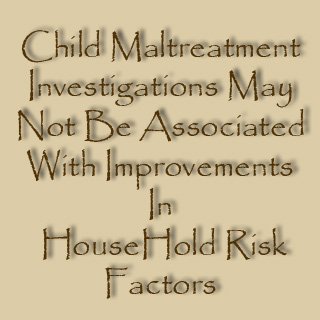
Throughout the study data from Longitudinal Studies of Child Abuse and Neglect was assessed by the authors. 595 children aged between 4 to 8 years were examined to find out if a CPS investigation for suspected child maltreatment is related with consequent improvements in household, caregiver and child risk factors. Interviews were held with the maternal caregiver of children when the kid was 4 years old and again at the age of 8. From the total of all children, 164 representing 27.6 percent went through a CPS investigation between both the interviews.
Investigators elucidate, “The findings identified no significant difference in social support, family function, poverty, maternal education and child behavior problems associated with CPS investigation. Maternal depressive symptoms were worse in households with a CPS investigation compared with those without an investigation. This study provides an important perspective on the association between a CPS investigation for suspected child maltreatment and subsequent household, caregiver and child risk. Our finding that CPS investigation is not associated with improvements in common, modifiable risk factors suggest that we may be missing an opportunity for secondary prevention.”
The investigated group was subjected to an average of 2.2 CPS with a range of one to nine investigations. Examinations were conducted in an average of 18.7 months before the interview that was initiated at 8 years. Child maltreatment was apparently noted between the interviews at ages 4 and 8 years in 74 investigated subjects forming 45.1 percent. Kristine A. Campbell, M.D., M.Sc., of the University of Utah, Salt Lake City, and colleagues observed that during the interview at age 4, households of children in the investigated group had lower family function and more poverty than households of non-investigated children.
Investigated children had maternal caregivers who were older, appeared less educated and had more depressive symptoms than caregivers of kids in the comparison group. Those investigated probably had greater chances of being white and with a past of CPS investigation. Interviews conducted at age 8 claimed that a CPS investigation is correlated with increased levels of poverty, maternal depressive symptoms and child behavior problems.
The study is published in the October issue of Archives of Pediatrics and Adolescent Medicine, one of the JAMA/Archives journals.
